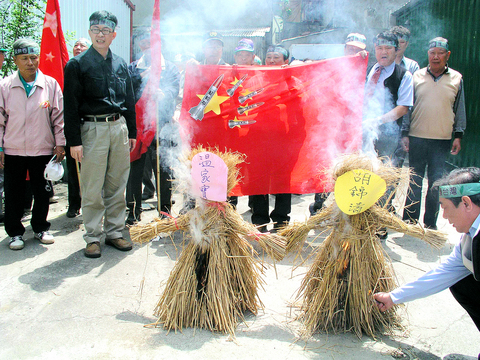Visiting US Secretary of State Condoleezza Rice urged Beijing at a news conference yesterday to take steps to cool tensions that have flared across the Taiwan Strait since the passage of the "Anti-Secession" Law, describing the law as an unwelcome piece of legislation.
Noting that cross-strait issues should be resolved by the two sides in a peaceful manner, Rice said that any unilateral moves that increase tensions are not helpful and that the Anti-Secession Law is not helpful in reducing cross-strait tensions.
Earlier in the day, Rice met with Chinese Foreign Minister Li Zhaoxing (

PHOTO: YANG JIN-CHENG, TAIPEI TIMES
Rice reportedly told Li that the US' "one China" policy and its commitment to the Three Communiques remain unchanged, but the obligations under the Taiwan Relations Act demand that the US make clear to both parties that unilateral moves are not helpful.
Reiterating Washington's concerns over the development of cross-strait relations, Rice stressed that cross-strait differences must be resolved peacefully.
"As for the anti-secession legislation, I said to my Chinese hosts that we would hope that this would be be something that, after having made dialogue across the Straits [sic] more difficult, that they would take steps to reduce tensions now with Taiwan," Rice said.
"The United States is not pleased when either side tries to change the status quo," she said, adding China should make moves to "show goodwill" in its relations with Taiwan.
For his part, Li told Rice that Taiwan remains the biggest challenge in Beijing-Washington relations and whether this issue can be properly handled will directly affect how US-China relations unfold.
"China hopes that the US side will adhere to the `one-China' policy ... and avoid any words or deeds that may aggravate the existing tense cross-straits [sic] situation," Xinhua quoted Li as saying.
Chinese leaders also reiterated their position that the :"Anti-Secession" law was aimed not at war, but at peaceful unification with Taiwan.
The law's passage last week showed "the resolve and sincerity of the Chinese mainland in developing cross-Strait relations and safeguarding peace in the region," Xinhua quoted State Councillor Tang Jiaxuan as saying.
Rice was to leave Beijing late yesterday at the end of her six-nation Asian tour that has also taken her to India, Afghanistan, Pakistan, Japan and South Korea.
Lai Ching-teh (

AIR SUPPORT: The Ministry of National Defense thanked the US for the delivery, adding that it was an indicator of the White House’s commitment to the Taiwan Relations Act Deputy Minister of National Defense Po Horng-huei (柏鴻輝) and Representative to the US Alexander Yui on Friday attended a delivery ceremony for the first of Taiwan’s long-awaited 66 F-16C/D Block 70 jets at a Lockheed Martin Corp factory in Greenville, South Carolina. “We are so proud to be the global home of the F-16 and to support Taiwan’s air defense capabilities,” US Representative William Timmons wrote on X, alongside a photograph of Taiwanese and US officials at the event. The F-16C/D Block 70 jets Taiwan ordered have the same capabilities as aircraft that had been upgraded to F-16Vs. The batch of Lockheed Martin

US President Donald Trump yesterday announced sweeping "reciprocal tariffs" on US trading partners, including a 32 percent tax on goods from Taiwan that is set to take effect on Wednesday. At a Rose Garden event, Trump declared a 10 percent baseline tax on imports from all countries, with the White House saying it would take effect on Saturday. Countries with larger trade surpluses with the US would face higher duties beginning on Wednesday, including Taiwan (32 percent), China (34 percent), Japan (24 percent), South Korea (25 percent), Vietnam (46 percent) and Thailand (36 percent). Canada and Mexico, the two largest US trading

GRIDLOCK: The National Fire Agency’s Special Search and Rescue team is on standby to travel to the countries to help out with the rescue effort A powerful earthquake rocked Myanmar and neighboring Thailand yesterday, killing at least three people in Bangkok and burying dozens when a high-rise building under construction collapsed. Footage shared on social media from Myanmar’s second-largest city showed widespread destruction, raising fears that many were trapped under the rubble or killed. The magnitude 7.7 earthquake, with an epicenter near Mandalay in Myanmar, struck at midday and was followed by a strong magnitude 6.4 aftershock. The extent of death, injury and destruction — especially in Myanmar, which is embroiled in a civil war and where information is tightly controlled at the best of times —

China's military today said it began joint army, navy and rocket force exercises around Taiwan to "serve as a stern warning and powerful deterrent against Taiwanese independence," calling President William Lai (賴清德) a "parasite." The exercises come after Lai called Beijing a "foreign hostile force" last month. More than 10 Chinese military ships approached close to Taiwan's 24 nautical mile (44.4km) contiguous zone this morning and Taiwan sent its own warships to respond, two senior Taiwanese officials said. Taiwan has not yet detected any live fire by the Chinese military so far, one of the officials said. The drills took place after US Secretary